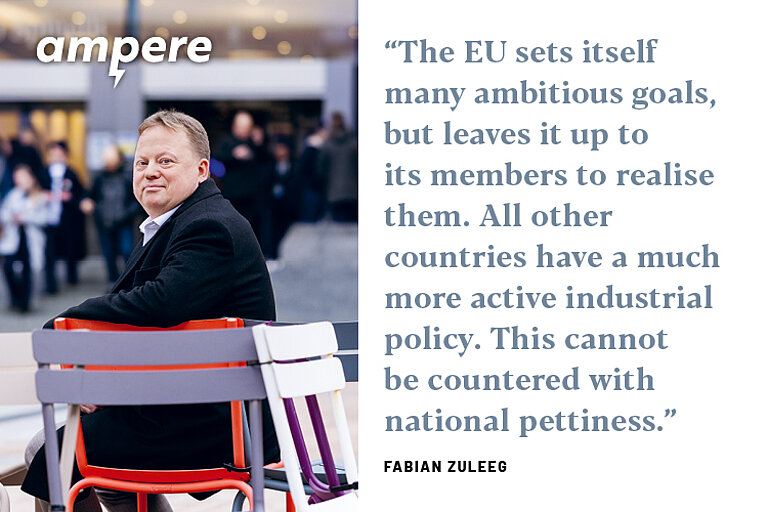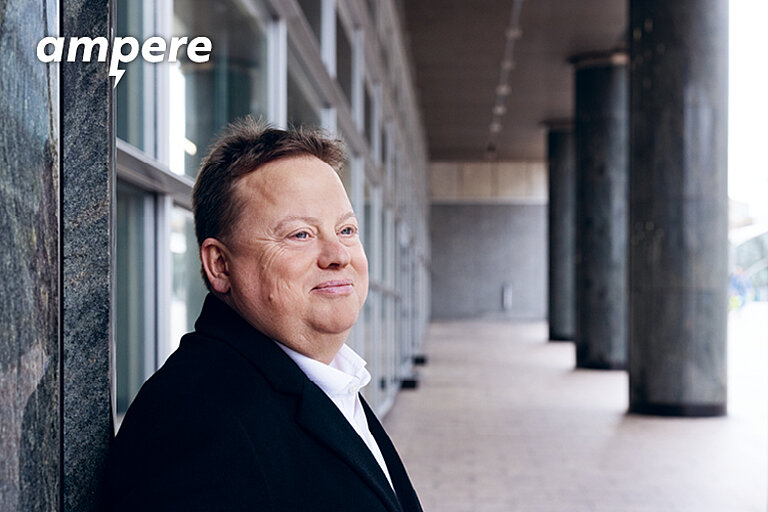Publications
European Affairs
27.05.2024
Together against the permacrisis
Fabian Zuleeg heads the European Policy Centre and is a renowned expert on politics in Brussels. In his view, there can only be one answer to the current accumulation of crises, and that is more cooperation in Europe.

One word is currently making quite a splash: “permacrisis”. It describes the new state of the world, in which “normal” no longer seems to exist. First the Covid pandemic, then the Ukraine war plus inflation – and all this against the backdrop of climate change. Fabian Zuleeg, Chief Executive of the European Policy Centre (EPC), a well-known Brussels think tank, is regarded as the creator of the word. This is how the economist describes the basic trend: “We are constantly dealing with new, interconnected crises that are more difficult to overcome than anything we have seen before.”
In Zuleeg’s view, the permacrisis is so dangerous because it coincides with a battered European Union. Populists are weakening the political centre in many places, politics is becoming more national again – and more short-term. Zuleeg believes this is precisely the wrong direction: “Europe must think more strategically and act together to avoid being pushed against the wall by the superpowers.”

Zuleeg has headed the EPC for ten years and is one of the best-known figures in the Brussels political arena. “I am not an outspoken optimist,” he explains, “but it is important that we are honest.” What Europe has done so far is no longer nearly enough in times of the permacrisis. The EU needs a jolt.
What should be reformed in the next legislative period? “The EU must move away from the unanimity rule on many issues.” In order to prevent blockades by individual states in the future, he proposes the “majority minus one” model, in which a decision is deemed to have been made if only one member votes against it. As an alternative, Zuleeg can imagine a “coalition of the willing”, which is where a group of countries joins forces and implements individual projects with a kind of parallel budget. According to the Treaty of Lisbon, this is possible in principle.
Zuleeg is also calling for a rethink in industrial policy. “Acting purely on a national level here is no longer up to date.” The EPC boss points out a fundamental problem: The EU sets itself many ambitious goals, but leaves it up to its members to realise them. Take climate protection, for example. In March 2023, the EU published the “Net-Zero Industry Act”, which stipulates that at least 40 per cent of the climate-neutral technologies required per year will be produced in Europe from 2030. However, it is up to national governments to decide where and how battery factories, hydrogen electrolysers or wind farms are built. There is therefore a risk that too little and only selective investment will be made in green technology. “All other countries have a much more active industrial policy – like the USA with its Inflation Reduction Act,” explains Zuleeg. This cannot be countered with national pettiness.
Chief Executive of the European Policy Centre
Joint action also requires joint resources. It is therefore high time for the EU to think about new sources of funding, says Zuleeg. He can imagine the Union receiving a fixed share of national corporate and consumption taxes in the future. “Taxes can provide more effective incentives than laws and regulations,” Zuleeg believes. But how will an EU levy be received by European companies that already pay significantly more taxes than their competitors in the USA or the UK? Zuleeg trusts in the insight of the economy. Many are “not far away” from the idea of an EU tax.
One thing is certain for the visionary Zuleeg: The permacrisis will be long lasting. He can already see the next clouds gathering on the horizon. If Donald Trump becomes President of the United States again, relations with the EU are likely to deteriorate. “It could even jeopardise the transatlantic alliance.” Added to this are the rivalries between China and the USA, a possible conflict over Taiwan and new challenges posed by artificial intelligence. For Zuleeg, these are all arguments in favour of more cooperation – not resignation. Despite all the challenges posed by the Covid crisis, the Europe expert is convinced of the Union’s capabilities: “We are the only region that has managed to do so many things together.”
